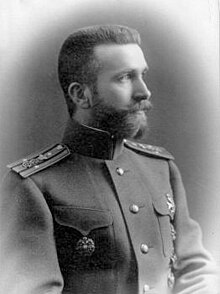Erwin Rahr
Erwin (Wladimir) Rahr (born January 23, 1880 in Arensburg , Livonia Governorate , Russian Empire ; † April 16, 1919 in Mitau , Courland , Latvia ) was a German-Baltic officer, colonel in the Imperial Russian Army, participant in the Russian Japanese War , World War I, and Russian Civil War .
Origin and youth
Erwin Rahr came from a German-Baltic merchant family of Scandinavian origin from Arensburg on the island of Ösel, part of the Livonia governorate of the Russian Empire . He was the son of Theodor Rahr (1845–1917) and Luise Pietsch (1847–1908). Although his father was Orthodox , all children were baptized Lutheran according to their mother's denomination . In 1899 he finished high school in Arensburg, after which he studied at the Alexej Military School in Moscow and left it on August 13, 1901 with the rank of lieutenant of the 114th Novotorg Infantry Regiment stationed in Mitau .
Military career
When the Russo-Japanese War broke out in 1904, he was voluntarily transferred to the Velikoluzker 12th Infantry Regiment, in whose ranks he took part in the fighting in Manchuria . He was wounded in the Battle of Mukden , but soon returned to the front and was awarded several medals.
After the war he became an instructor in the First Moscow Cadet Corps, at the same time he taught the German language at the Alexej Military School.
At the beginning of the First World War he was a colonel . He commanded a battalion of the 4th Nesvishsky Grenadier Regiment. In order to be of one faith with his soldiers, he converted to Orthodoxy in 1915 and took the name Vladimir . In May 1916 he was seriously wounded when the Germans attacked Baranowitschi . During his healing period, he was temporarily appointed director of the First Moscow Cadet Corps in Moscow.
Immediately after the October Revolution in 1917 organized Rahr in Moscow using the cadet of the top vintages defending the barracks of the First Cadet Corps in the Moscow district of Lefortovo against the Bolsheviks . When the barracks were finally taken under artillery fire after several days of fighting and no instructions were given by the commander-in-chief of the Moscow military district Konstantin Ryabzew , Rahr released the cadet students disguised in civilian clothes to save them from imprisonment or shooting. He himself joined the Junkers' defense of the Kremlin . After the Kremlin surrendered, he went into hiding. In 1918 he and his family got on a refugee train from Baltic Germans and Latvians to Riga, which was under German occupation . Shortly before the occupation of Riga by the Red Army in January 1919, he sent his family to safety in Germany. He himself took over command of the 3rd platoon of the Baltic State Army .
After the withdrawal of the White Troops and the Baltic State Armed Forces from Riga, he joined the volunteer department of Prince Anatol P. Liewen in Libau , who appointed him as his deputy. On March 18, 1919, the Russian Libau volunteer division and the Baltic State Armed Forces expelled the Red Army from Mitau. After an inspection of the city prison, Rahr fell ill with typhus and died on April 16, 1919. He was buried with military honors in the Russian cemetery in Mitau.
family
In 1905 Rahr married Julia Hom (1877–1957), with whom he had three children: Karin (* 1906 in Yekaterinburg , † 1993 in Hamburg ), Wladimir (* 1908) and Lew (1910–1935).
Erwin Rahr had eight siblings: Arved Rahr (* 1873 in Arensburg , † 1932 in Moscow ). Erich Rahr (* 1875 in Arensburg, † 1934 in Moscow) was a pediatrician in Moscow. He fell victim to the Stalinist terror . Oskar Rahr (* 1876 in Arensburg, † 1919 in Moonsund ) was the manager of the Buxthoeven family's lands on Moon and Ösel and was murdered by mutinous Estonian recruits. Axel Rahr (* 1878 in Arensburg, † 1953 in Ulm ). Erika Rahr (* 1882 in Arensburg, † 1889 in Arensburg). Arvor Rahr (* 1882 in Arensburg). Luise Karelski (* 1883 in Arensburg). Margarethe Rahr (* 1888 in Arensburg, † 1972 in Regensburg ).
bibliography
- Kurt v. Braatz: Prince Anatol Pavlovich Lieven. In the struggle against Baltic separatism, Russian Bolshevism and the Awaloff-Bermondt affair. Stuttgart 1926.
- Pamjatka Liwenza: (The memorial book of the Lievenkämpfers) Riga 1929. (Russian)
- Beloje Delo. Letopis' beloi bor'by (The White Cause. Chronicle of the White Struggle) (Russian). Volume 4. Publishing house "Mednyi Vsadnik". Berlin 1927.
- Sluschba svjasi Liwenzew i Severosapadnikow (The Liaison Service of the Lievenkampfans and the Northwest Army) (Russian). Berlin 1931.
- Gleb Rahr : I budet nasche pokolenje dawat 'istorii ottschet. Vospominanija (And our generation will be accountable to history. Memories) (Russian), Russkij Put 'publishing house, Moscow 2011, ISBN 978-5-85887-382-2
Web links
- Erik Amburger List of Baltic Germans in the Russian Empire
- Article about Erwin Rahr (russ.)
- Kto posylal I na smert '. The October fights in Moscow in 1917 (russ.)
- Krowavaja nedelja. The defense of Moscow against the Bolsheviks (russ.)
- The forgotten war. German volunteers in the Russian Northwest Army (russ.)
- The staff of the Northwest Army (russ.)
| personal data | |
|---|---|
| SURNAME | Rahr, Erwin |
| ALTERNATIVE NAMES | Rahr, Erwin Theodor (full name); Rahr, Wladimir Fjodorowitsch (Russian) |
| BRIEF DESCRIPTION | Colonel of the Imperial Russian Army, participant in the Russo-Japanese War, World War I and the Russian Civil War |
| DATE OF BIRTH | January 23, 1880 |
| PLACE OF BIRTH | Arensburg , Livonia |
| DATE OF DEATH | April 16, 1919 |
| Place of death | Mitau , Courland |
